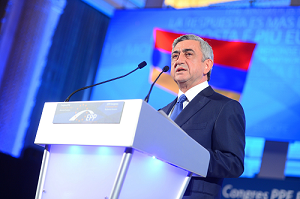Armenia Seeks to Enhance Cooperation with the West
By Natalia Konarzewska
June 22, 2017, the CACI Analyst
Armenia has recently sought to reinvigorate its relationship with NATO and the European Union, despite its membership in Russia-led Eurasian Economic Union (EEU) and Collective Security Treaty Organization (CSTO). In late March, Armenia initialed a new Comprehensive and Enhanced Partnership Agreement with the EU, intended to upgrade bilateral political and economic ties. Moreover, during his recent visit to NATO’s headquarters in Brussels, President Serzh Sargsyan reaffirmed Armenia’s intent to continue top level political dialogue with NATO and the country’s willingness to enhance the scope of joint activities. The push to rekindle relations with NATO and the EU amidst one of the most serious standoffs between Russia and the West suggests that Armenia, which is one of Moscow’s most loyal allies, is reassessing its ties with Russia and Russia-led international blocks.

Karakbakh negotiations on hold as Armenia gears up for parliamentary elections
By Armen Grigoryan
January 12th, 2017, The CACI Analyst
Further negotiations on the Nagorno-Karabakh issue seem to be practically postponed until Armenia completes its parliamentary elections in April 2017. At the same time, the government demonstrates an unwillingness to proceed beyond rhetoric with governance and economic reforms. The administration’s inability to deliver satisfactory economic results and ensure social development, as well as its close connections with Russia with a strong clientelism component, suggest a further growth of dependence and compliance with Moscow’s political agenda.
Russian intervention in Syria and the Caucasus
By Stephen Blank
November 27th, 2016, The CACI Analyst
Few people think about trends in the Caucasus with reference to or in the context of Russia’s Syrian intervention. But Moscow does not make this mistake. From the beginning, Moscow has highlighted its access to the Caucasus through overflight rights and deployment of its forces in regard to Syria, e.g. sending Kalibr cruise missiles from ships stationed in the Caspian Sea to bomb Syria. Therefore we should emulate Russia’s example and seriously assess military trends in the Caucasus in that Syrian context.
Georgia’s prime minister visits Armenia
By Erik Davtyan
October 3rd, the CACI Analyst
On September 5, Georgia’s Prime Minister Giorgi Kvirikashvili, along with Vice Prime Minister and Minister of Energy Kakha Kaladze, and Deputy Minister of Foreign Affairs David Dondua, paid a one-day visit to Yerevan. Kvirikashvili has previously visited Armenia as Minister of Economy and Sustainable Development, however this was his first official visit after he became Prime Minister in December 2015. The visit came nearly a month before parliamentary elections in Georgia, which are set for October 8. Less than one week before, Kvirikashvili made a similar visit to Azerbaijan. During both visits, the Georgian delegation was composed of exactly the same level of representatives, although another deputy foreign minister was present in Azerbaijan – indicating the importance that Georgian authorities attach to demonstrating a balanced policy towards its two neighbor states.
Kyrgyzstan to retain stable currency
By Tony Pizur
June 14th, 2016, The CACI Analyst
After the ruble crashed in 2014, the Kyrgyz Central Bank (KCB) prevented Kyrgyzstan’s national currency, the som, from depreciating in tandem with the Russian currency. Given Kyrgyzstan’s ascension into the Eurasian Economic Union (EEU) and the country’s heavy reliance on remittances from expatriates living in Russia, the KCB’s decision to maintain a relatively strong Kyrgyz currency seems counterintuitive. However, the stable som policy is predicated on long-term structural changes in trade patterns toward China. With the Chinese currency tied to the U.S. dollar, the decision to keep the som stable is based more on central bank policies in Washington and Beijing than in Moscow.







